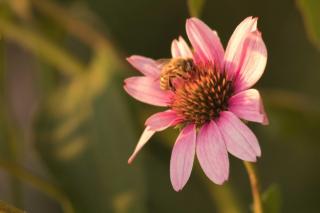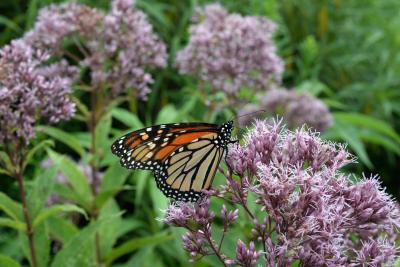GB Installs Pollinator Gardens to Support Bees and Other Pollinator Creatures

Great Barrington is doing its part to create a bee-friendly habitat in downtown Great Barrington, with the installation of pollinator plantings on Main Street and nearby.
In coming weeks flowering plants will be installed at the base of the town’s sentinel of about 80 deciduous trees, mostly on Main Street. Flowers ranging from black chokeberry to foxglove, aster, orange butterfly weed, lupine and blue vervain are among the many varieties that will comprise the mix of new plantings.
This project evolved from the Pollinator-Friendly Community Resolution passed by the 2016 Annual Town Meeting. That resolution calls for creation of a local ecosystem that sustains native pollinators: bees, butterflies, beetles, flies, ants and certain birds. These creatures are vital to the pollination of food crops; in Massachusetts bees pollinate 45 percent of the state’s food crops.
 Pollination happens when pollinator insects transfer pollen grains from male to female plants, triggering seed production. Bees are the busiest pollinators, but their numbers have been on a sharp decline around the globe due to bee colony collapse, harmful pesticide use, loss of friendly habitats, air pollution and climate warming. A shortage of bees and other pollinators is a threat to agriculture and other plants that are vital for life-sustaining ecosystems.
Pollination happens when pollinator insects transfer pollen grains from male to female plants, triggering seed production. Bees are the busiest pollinators, but their numbers have been on a sharp decline around the globe due to bee colony collapse, harmful pesticide use, loss of friendly habitats, air pollution and climate warming. A shortage of bees and other pollinators is a threat to agriculture and other plants that are vital for life-sustaining ecosystems.
The pollinator project is part of the wider downtown infrastructure improvement plan now under way, including improvements to sidewalks and related work, including repaving of the town-owned Triplex Theater parking lot.
Work crews will be installing the pollinator gardens between 4 a.m. and noon to minimize disruption on Main Street, starting soon.
"Great Barrington is a trendsetter on pollinator-friendly community policies," said Vivian Orlowski, chair of the town's Agricultural Commission. "Thanks to the leadership of Public Works Superintendent Sean Van Deusen and his DPW team, we are putting these policies into practice. The Agricultural Commission encourages residents, schools, farms and other businesses to learn from thetown's initiatives and adapt pollinator-friendly practices for their own properties."

